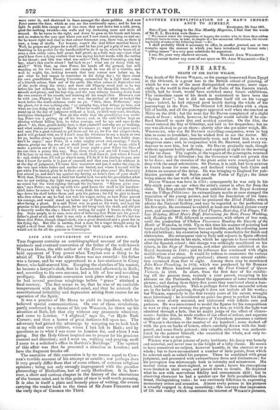LIFE AND CONVERSION OF WILLIAM HONE.
Tins fragment contains an autobiographical account of the early misdeeds and eventual conversion of the father of the well-known WILLIAM HONE, the able author of the Every-day Book, and the bold opponent of Tory power when Toryism was a thing to be afraid of. The life of the elder HONE was not eventful : his father was a farmer, and he was apprenticed to a law-stationer in Carey Street, who half-starved him. Escaping the clutches of his master, he became a lawyer's clerk, first in London and afterwards in Bath ; and, according to his own account, led a life of low and revolting profligacy. His ultimate conversion took place after a fever; but he had several previous misgivings before " grace " attained a final mastery. The fact seems to be, that he was of an excitable temperament with an ill-balanced mind, and that he mistook the constitutional irritability and depression arising from excess for an operation of the Spirit.
It was a practice of Mr. HoNs to yield to impulses, which he believed special communications. On one of these revelations, partly confirmed by a dream of his son Witaaam, he threw up his situation at Bath, left that city without any prospects whatever, and came to London. " I alighted," says he, "at Hyde Park Corner; and then a horror of great darkness fell upon me. The adversary had gained the advantage by tempting me to look hack at my wife and two children, whom I had left in Bath ; and by questions as to what I was come to London for, and where I was going. But the Holy Ghost inspired me to prayer for his gracious counsel and direction ; and I went on, walking and praying, until I came to a solicitor's office in Bartlett's Buildings." The upshot of this affair was that he procured a situation in London ; and here the fragment breaks off
The narrative of this conversion is by no means equal to Cow- PER'S terrible account of his attempt at suicide ; nor perhaps does it very greatly differ from that of some others, of extreme religious opinions ; being not only strongly impregnated with the peculiar phraseology of Methodism, but of early Methodism. It is, how- ever, a short and curious chapter in the history of the aberrations of the human mind, and in this point of view is well worth perusing. It is also in itself a plain and homely piece of writing, the events carrying the reader back to the times of Sir Jour/ FIELDING and the early days of GEORGE the Third.


























 Previous page
Previous page